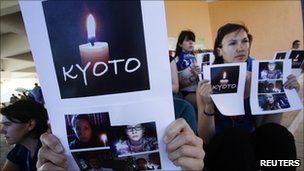 UN talks in Cancun have reached a deal to curb climate change, including a fund to help developing countries.
UN talks in Cancun have reached a deal to curb climate change, including a fund to help developing countries.
Nations endorsed compromise texts drawn up by the Mexican hosts, despite objections from Bolivia.
The draft documents say deeper cuts in carbon emissions are needed, but do not establish a mechanism for achieving the pledges countries have made.
Some countries' resistance to the Kyoto Protocol had been a stumbling block during the final week of negotiations.
However, diplomats were able to find a compromise.
Delegates cheered speeches from governments that had caused the most friction during negotiations - Japan, China, even the US - as one by one they endorsed the draft.
BBC environment correspondent Richard Black said the meeting did not achieve the comprehensive, all-encompassing deal that many activists and governments want.
But he said it was being "touted as a platform on which that comprehensive agreement can be built".
Mexico's President Felipe Calderon said the summit had allowed leaders to "glimpse new horizons" where countries had the "shared task to keep the planet healthy and keep it safe from [humans]".
The UK Prime Minister David Cameron said: "Now the world must deliver on its promises. There is more hard work to be done ahead of the climate change conference in South Africa next year."
The Green Climate Fund is intended to raise and disburse $100bn (£64bn) a year by 2020 to protect poor nations against climate impacts and assist them with low-carbon development.
A new Adaptation Committee will support countries as they establish climate protection plans.
And parameters for funding developing countries to reduce deforestation are outlined.
But the deal is a lot less than the comprehensive agreement that many countries wanted at last year's Copenhagen summit and continue to seek. It leaves open the question of whether any of its measures, including emission cuts, will be legally binding.
"What we have now is a text that, while not perfect, is certainly a good basis for moving forward," said chief US negotiator Todd Stern.
His Chinese counterpart, Xie Zhenhua, sounded a similar note and added: "The negotiations in the future will continue to be difficult."
Bolivia found faults both with elements of the deal and with the way the texts were constructed through private conversations between small groups of countries.
Delegation chief Pablo Solon said that what concerned him most was that commitments would not be made under the Kyoto Protocol.
"We're talking about a [combined] reduction in emissions of 13-16%, and what this means is an increase of more than 4C," he said.
"Responsibly, we cannot go along with this - this would mean we went along with a situation that my president has termed 'ecocide and genocide'," Mr Solon said.
But Claire Parker, senior climate policy adviser for the global conservation group IUCN, said: "We have moved away from the post-Copenhagen paralysis.
"Developing countries can now see new money on the table which they can draw on to adapt to the impacts they're already facing and reduce emissions."
Tara Rao, senior policy adviser with environmental group WWF commented: "There's enough in it that we can work towards next year's meeting in South Africa to get a legally binding agreement there."
The final day of the two-week summit had dawned with low expectations of a deal.
But ministers conducted intensive behind-the-scenes diplomacy to formulate texts that all parties could live with.
Russia and Japan have secured wording that leaves them a possible route to escape extension of the Kyoto Protocol's legally binding emission cuts, while strongly implying that the protocol has an effective future - a key demand of developing countries.
The Green Climate Fund will initially use the World Bank as a trustee - as the US, EU and Japan had demanded - while giving oversight to a new body balanced between developed and developing countries.
Developing countries will have their emission-curbing measures subjected to international verification only when they are funded by Western money - a formulation that seemed to satisfy both China, which had concerns on such verification procedures, and the US, which had demanded them.



